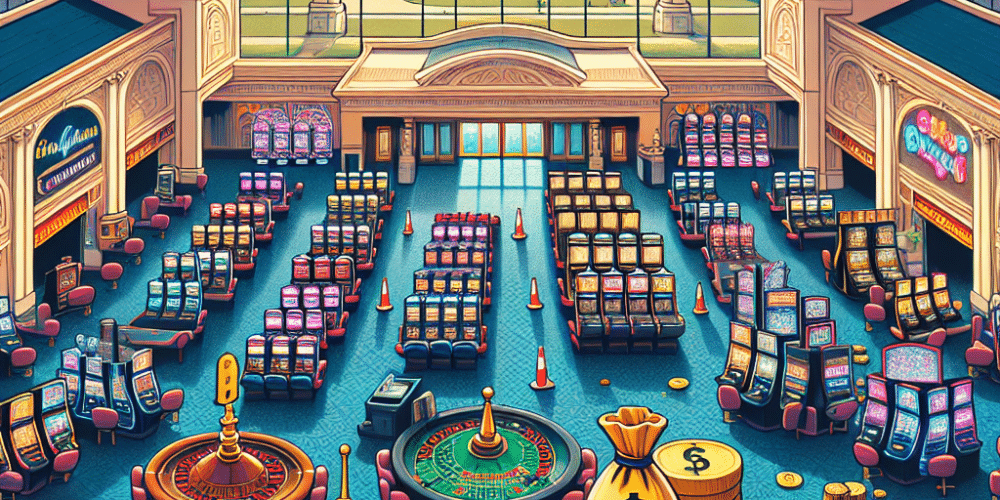In September 2025, Delaware’s three casinos reported a collective revenue of $36.4 million, marking a significant decrease of 21.3 percent compared to the same month the previous year and a 19.2 percent drop from August 2025. This downward trend raises questions about the current state and future of Delaware’s gaming industry.
Delaware Park, the leader in the state’s casino market, reported a revenue of $15.3 million. Despite maintaining the top spot, this figure represents a 16.3 percent decline year-over-year. The revenue from video lottery terminals, a major contributor, was $13.1 million, which is down 17.8 percent compared to the previous September. Table games generated $2.2 million, showing a decrease of 6.3 percent.
The second-largest casino, Bally’s Dover, experienced even sharper declines. Its revenue dropped to $11.9 million, reflecting a significant 28.1 percent reduction from the previous year. Video lottery terminals accounted for $10.8 million of this revenue, down 27.3 percent, while table games brought in $1.2 million, suffering a dramatic 35.2 percent decline. Such figures highlight a challenging environment for the casino.
Harrington Casino, the smallest of the three, reported a revenue of $9.2 million, down by 18.9 percent year-over-year. Interestingly, while its revenue from video lottery terminals was $32.3 million — a notable figure in contrast to its overall revenue, this still represents a 21.3 percent decrease from September 2024. The revenue from table games stood at $4.1 million, down 20.7 percent.
This substantial decline in revenue across all of Delaware’s casinos indicates broader economic and industry challenges. Analysts suggest a combination of factors might be at play. The potential increase in competition from neighboring states with expanding gaming options could be drawing customers away. Additionally, changing consumer behaviors and economic pressures might be causing a shift in how and where people choose to spend their leisure dollars.
The current economic climate could also be impacting discretionary spending, leading to fewer visits to casinos. As one observer noted, “The economic situation has tightened belts, and entertainment expenses are often the first to be cut.” This sentiment captures a growing concern among industry leaders about the sustainability of current business models without adapting to these new realities.
Conversely, some industry insiders remain cautiously optimistic, arguing that the decline is part of a typical cyclical pattern often seen in the gaming industry. They point out that the market has experienced similar downturns in the past and has rebounded thanks to strategic adjustments and innovations. “It’s about weathering the storm and preparing for the next upswing,” suggests one experienced voice in the industry.
In light of these challenges, Delaware’s casinos might need to explore new strategies to regain their competitive edge. This could involve diversifying the types of games offered, enhancing customer experiences, or investing in marketing initiatives to attract a broader demographic. There’s also potential for technological innovations, such as integrating more interactive and virtual gaming experiences, which could appeal to younger audiences who prefer digital engagement.
Moreover, regulatory changes might also play a pivotal role in shaping the future of Delaware’s gaming industry. With neighboring states potentially altering their gaming laws, Delaware might find opportunities to innovate within its regulatory framework to attract new business.
While the current figures paint a challenging picture for Delaware casinos, the future is not without hope. The industry has historically shown resilience and adaptability, and with the right mix of innovation, strategic management, and perhaps regulatory support, a turnaround is possible. The next few months will be crucial for observing how these establishments respond to ongoing economic pressures and evolving consumer preferences.
Nevertheless, the decline in September’s revenue underscores the pressing need for the state’s gaming industry to rethink its approach. As Delaware’s casinos navigate this turbulent period, their responses could provide valuable lessons for similar markets facing parallel challenges. Whether by embracing new technologies, adjusting their offerings, or advocating for strategic regulatory support, Delaware’s casinos will need to chart a course that secures both their immediate recovery and long-term success.

David Harrison stands tall in gambling journalism, marrying his firsthand casino experiences with a deep understanding of betting psychology. His articles transform complex gambling jargon into engaging tales of strategy and chance, making the world of betting accessible and enjoyable. David’s knack for narrative extends beyond print, making him a sought-after speaker on gambling trends and future bets. In the realm of gambling, David is both a scholar and a storyteller, captivating readers and listeners alike.
















